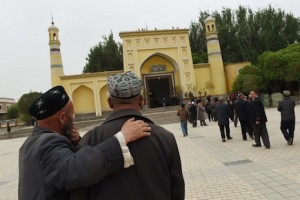China mulls banning ‘terrorist’ clothing
UCA News, 26 August 2015
UCA News – Chinese legislators have proposed a new nationwide ban on “terrorist” clothing in the latest move designed to curb Islamic extremism in restive Xinjiang. The draft amendment proposed Aug. 24 by China’s top legislature does not specify what would be criminalized. However, the proposed ban is believed to apply to burqas, separatist flags and Islamic beards.
Those found guilty of wearing or forcing others to wear “clothes or symbols in public associated with terrorism and extremism” would face three years in prison.
“The amendment could prevent terrorist activities from spreading across China. It shows the nation’s zero tolerance toward any action related to terrorism or extremism,” Li Wei, an anti-terrorism specialist at the China Institute of Contemporary International Relations, told the state-run Global Times.
Although countries including France and Turkey have banned burqas, as noted by China’s state media, most have done so in state institutions such as courts and government buildings. There are few examples of countries also banning other forms of Islamic appearance including beards.
Crackdown
In January, Xinjiang’s regional capital Urumqi banned burqas from being worn in public amid a one-year “strike-hard” campaign against minority Muslim Uighur separatists. This campaign was a response to a series of deadly attacks.
In March, a court in the Uighur-dominated city of Kashgar sentenced a 38-year-old man to six years in prison for growing a beard. His wife was given two years for wearing a veil. They were found guilty of “picking quarrels and provoking trouble,” the court said.
Five Muslim men were put on trial in June for wearing “crescent moon-shaped” beards in the remote city of Atushi, close to the border with Kyrgyzstan.
Although there are no current laws banning Islamic dress outside of Xinjiang, the crackdown has extended to other parts of the country in recent months.
A university provoked an online debate in May after ordering nine female students to remove their veils in Xian, a city with a large minority Muslim Hui population in central China.
Earlier this month, armed police took away a group of women who were wearing burqas while shopping for shoes in the city of Nanyang, Henan province. Many users on the micro-blogging site Weibo backed the police — a sign of growing intolerance of overt Islamic dress among China’s mainly atheist population.
“Other countries have banned the wearing of this kind of dress. If you see it on the street, inform the police. Muslim brothers and sisters going outside should not scare people,” wrote one Weibo user.
Kayum Masimov, head of the Uighur Canadian Society and a Xinjiang exile, said a nationwide ban on Islamic dress would fuel humiliation and oppression of Muslims, calling the move a double standard.
“The Chinese Communist Party is eager to exhibit Uighurs and other ‘minorities’ during its state-run shows at the Great Hall of the People,” he said in reference to China’s rubber-stamp parliament in Beijing. “But the same clothes are banned in our region.”
http://www.ucanews.com/news/china-mulls-banning-terrorist-clothing/74146


